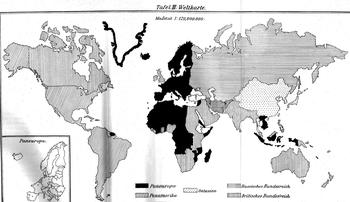Report: Workshop "From Empires to Empire? European Integration in Global Context, 1950s to 1990s"
News from May 03, 2016
Historical research on European integration since 1945 has largely focused on Western European actors, domestic motives, and policies. It has only recently begun to explore connections between Empire, decolonization, and European integration, and continuities from national empires into the European Community (EC) as in its development aid policy.
In a recent event, the KFG hosted a first larger meeting ever that brought together the various researchers contributing to this emerging field of research. Organized by KFG Senior Fellows Wolfram Kaiser (Portsmouth) and Kiran Klaus Patel (Maastricht) on April 7 and 8, 2016, this workshop convened a group of some 20 scholars working on these issues. While all contributions highlighted the historical dimension of this topic, the background of several contributors and the debates had a strong interdisciplinary dimension. Overall, the workshop’s eleven presentations shed a lot of new light on the nexus between colonialism, decolonization, and European integration. It helped to complicate existing interpretations, according to which the link to empire was either but a footnote in European integration or – as the radical alternative to this interpretation – its main driver and core.
The link between European integration and Africa stood front and center in the first panel. Anne-Isabelle Richard (Leiden) assessed the role of the Council of Europe in the 1950s’ debates about Eurafrique as the plan of a strong strategic partnership between Western Europe and Africa. Frank Gerits (Bloemfontein) then zoomed in on the relationship between the nascent European Economic Community and Ghana and South Africa. The second panel shifted the focus to the Dutch case. Robin de Bruin (Amsterdam) stressed the link between the end of the Dutch empire, Dutch politicians’ growing sense of European decline, and their attitudes vis-à-vis European integration. In the second contribution to this panel, Lindsay Aqui (London) described the relationship between Ghanaian leader Kwame Nkrumah and British Prime Minister Harold Macmillan in conjunction with Britain’s 1961 EEC membership application.
In their contribution opening the third panel, Peo Hansen and Stefan Jonsson (both Linköping) underscored the geopolitical dimension of the European integration project and its correlation to European colonialism in Africa, using the Treaty of Rome negotiations as their case study. Patrick Pasture (Leuven) then analyzed the legacies of empire in the European integration project, while also tracing how this important post-war experience was marginalized in public memory discourses in more recent decades.
Panel 4, starting the second day of the workshop, commenced with a co-authored paper by Magdalena Kania and Pawel Frankowski (both Cracow). Building on fresh research in the private papers of European civil servant Noël Salter, it examined the role of post-imperialism as a driving concept of British post-war Commonwealth policy, and the interplay between British diplomats and the EC since the 1960s. Alexandra Athanasopoulou Köpping (Leipzig) based her contribution on the debates in the European Parliament’s Development Committee and argued that the period from 1979 until 2004 saw a shift in discourse from high engagement and strong demands in the realm of European development to a more neo-liberal turn.
The focus then turned to Asia with Steffen Rimner’s (New York) presentation on role of the EC in the Chinese-Japanese conflicts of the 1970s, which started the fifth panel. Jack Veugelers (Toronto) then discussed the nexus between European ex-colonials and the rise of far-right politics in the European Union by analyzing the role of the so-called pieds noirs (European settlers in Algeria fleeing the country after independence) and the Front National. In the final paper, Joaquín Roy (Miami) redirected the attention to the EC/EU’s relationship with Latin America, more precisely on the role of Spain as a useful actor for both the EU and the Latin American countries in various efforts for regional integration.
Together, the various contributions showed the significance of the topic, and the multifarious links between colonial rule, decolonization, and European integration. Having said this, there was no consensus on the exact importance and the precise nature of this link. The KFG workshop has commenced a debate that will certainly continue in the future.
Background information (World Map from "Paneuropa" by R.N. Coudenhove-Kalergi):Richard Nikolaus Coudenhove-Kalergi was one of the most prominent protagonists in the debate about European integration during the interwar years. His notion of Europe is markedly different from today’s EU, however. His 1923 book Paneuropa featured a map with the parts of the world that he wanted to become part of this union. For him, the colonies of the various continental European nation-states should become part of Paneuropa.
Author: Kiran Klaus Patel


